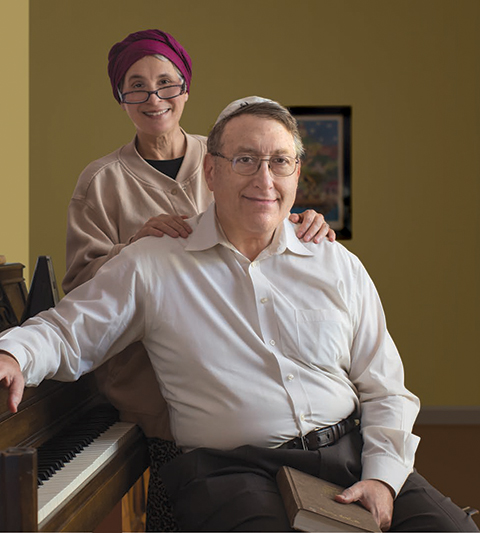Cantor Redfern's Story

“When this happened I couldn’t talk, let alone sing. I’m so thankful to be back doing what I love.” - Elwin Redfern, shown here with his wife Roberta. Elwin is a cantor who sings liturgical music and leads prayer at his synagogue.
Elwin Redfern was showering one morning when he collapsed and could not move his right side or call out for help. Luckily, his wife Roberta heard the fall and immediately called 911. First responders recognized the signs of stroke and brought him directly to Holy Cross Hospital, for expert diagnosis and treatment at one of the region’s most comprehensive primary stroke programs.
Fast, innovative stroke care begins in the Emergency Center at both Holy Cross Hospital and Holy Cross Germantown Hospital by alerting the stroke activation team. This group of specialists—including emergency room staff, stroke physicians, neuroradiologists, nurses and nurse practitioners, intensive care specialists and laboratory technologists—responds to every stroke emergency, 24 hours a day, seven days a week.
“It was really, in many ways, a miracle from heaven,” says the 64-year-old cantor, of the care he received.
“A fast, accurate diagnosis and rapid treatment can minimize the negative effects of stroke and greatly improve patient outcomes for our community members,” explains Shahid Rafiq, MD, medical director, Neurology and Stroke, Holy Cross Health.
Because Elwin was able to get to the hospital and was diagnosed quickly, his doctors were able to give him tPA (tissue plasminogen activator) therapy, a “clot-busting” drug that restores blood flow and may stop an ischemic stroke, thus reducing its disabling effects. tPA can be delivered to patients who meet certain criteria within a three to four-and-a-half hour window from the start of a stroke.
While in the Emergency Center, Elwin had a MRI/MRA, which revealed a stroke and that a segment of his carotid artery on the left side of his neck was 95 percent blocked. To open blood flow to Elwin’s brain, a neurointerventionalist performed an innovative, less invasive endovascular procedure—entering through an artery in his groin—to reach the blockage and place a stent to repair it.
Comprehensive Stroke Care
Elwin was walking the day after his stroke and received five days of comprehensive inpatient rehabilitation services including speech, occupational and physical therapy before continuing his recovery at an acute care rehabilitation facilit.
Patients like Elwin who are at risk for or suffer a stroke can benefit from Holy Cross Health’s preventive medicine, community health services, support groups, rehabilitation, education and coordinated follow-up care to help stay on the path to better health.
Neuroscience Expertise
This kind of multidisciplinary treatment is not unusual at Holy Cross Health. “Our Neuroscience Program includes specialists in neurology, neurosurgery, neuroradiology and interventional neuroradiology who work together to plan the best possible, minimally invasive treatment for patients facing neurologic diseases, such as stroke, epilepsy, spinal problems, Parkinson’s disease and others,” says Zachary Levine, MD, medical director, Neurosurgery and Neuroscience, Holy Cross Health.
“When this happened I couldn’t talk, let alone sing,” says Elwin Redfern, a cantor who sings liturgical music and leads prayer at his synagogue. Shown here with his wife Roberta, he adds, “I’m so thankful to be back doing what I love.”
Three months after his stroke, as part of his follow-up treatment, Elwin received a second stent to open another section of his left carotid artery that was constricted.
“The care was absolutely superb,” says Roberta. “Every person was so kind and knowledgeable—and the professionalism was amazing. Elwin was even singing to the staff before he left."
Learn more about our Stroke Program and the new Stroke Support Group at Holy Cross Germantown Hospital.
Learn more about Holy Cross Hospital's Gold Plus recognition and Holy Cross Germantown Hospital's Gold Plus recognition for stroke care from the American Stroke Association.
Use the F.A.S.T. test for recognizing and responding to stroke symptoms:
F = FACE: Ask the person to smile. Does one side of the face droop?
A = ARMS: Ask the person to raise both arms. Does one arm drift downward?
S = SPEECH: Ask the person to repeat a simple sentence. Does the speech sound slurred or strange?
T = TIME: If you observe any of these signs, it’s time to call 9-1-1 or get to the nearest stroke center or hospital emergency room for rapid diagnosis and treatment.
